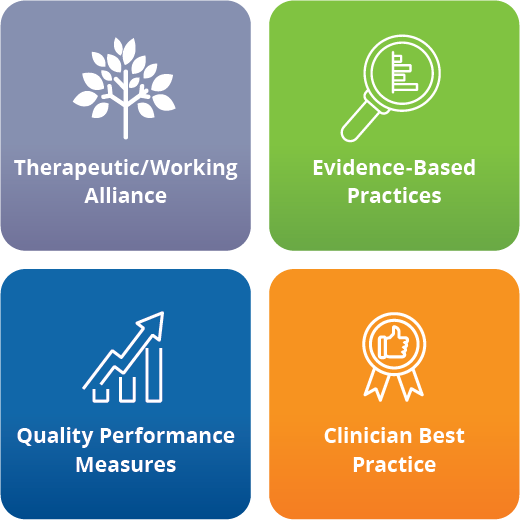Our care begins and ends with the patient. We are committed to ensuring patients have access to the care, clinical standards and outcomes they deserve through a four-part clinical model:
Patient-Centered Clinical Care

- DBH Therapeutic Alliance Tool
- ACCESS via Virtual Programming
- Patient-Centered Care
- Collaborative Documentation
- Patient Experience Surveys
- Connection & Community via Alumni App
- Individualized & Eclectic Modalities/Programs (e.g., Conscious Recovery, Path to Peace, HAES, School Support Program)
- Acceptance & Commitment (ACT)
- Cognitive Behavioral Therapy
- Exposure Response Prevention (ERP)
- Dialectical Behavioral-Informed
- Motivational Interviewing (MI)
- Stages of Change (TTM)
- Trauma-Informed Strategies
- Family Systems
- Columbia Protocols (C-SSRS)
- Transcranial Magnetic Stimulation (TMS)
*Timing of EBPs
- Outcomes: CSAT, PHQ-9, RAS-41, GAD-7, DASS-21, IES-2, EDE-Q, SASE, GAD-7, NPS
- Measurement-Based Treatment Planning
- HEDIS Measures:
- Transitions of Care
- Readmission Rates
- Social Determinants
- Aftercare Appointments
- MAT I/E
- Center of Excellence Scorecard
- Discovery365
- Clinical Supervision & Consultation Framework
- Clinical Resources (e.g., Clinician’s Desk Reference (CDR)
- Adherence to Regulatory Boards
- Professional Development
- Diversity, Equity & Inclusion (DEI)
- Cultural Humility & Sensitivity Initiatives
- Employee Engagement & Wellness
The Family & Patient Care
Family members play a key role in the successful outcome of every patient. Treatment is temporary, families are forever. At the completion of treatment, family members often play an essential role in the support of patients and their long-term recovery. And because of the importance in maintaining the gains made in treatment and in sustaining recovery, at Discovery Behavioral Health, families are considered integral members of the treatment team. Interpersonal family dynamics are a key point of focus in therapy – it is often within the family setting that the behavioral health or addiction issue is played out (*this is a widely accepted view in SUD though it is pretty controversial in ED-not that it should be). Family compositions, hierarchies, roles, ascribed characteristics and patterns of interacting within a family can be explored and healed. Engagement, withdrawal, power struggles, intimacy, isolation, and a sense of self are just a few of the many dynamics that can be observed and improved through the therapeutic process.
In many cases, family interactions reveal unspoken feelings to be shared, wounds to be healed and new, more effective ways of engaging. In addition to making the family a part of the patient’s therapeutic healing process, we also encourage family members to address how they have been impacted and to work on their own development. Often when a patient receives help, the family benefits as well to the extent they view treatment as an opportunity for everyone in the family to heal.
At Discovery Behavioral Health, we offer the necessary resources and skills to help broaden perspectives of loved ones and provide an understanding of the treatment and recovery process.
